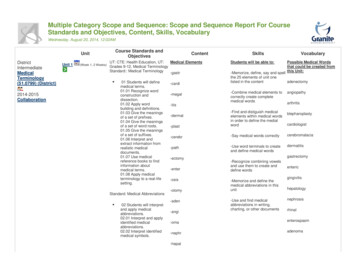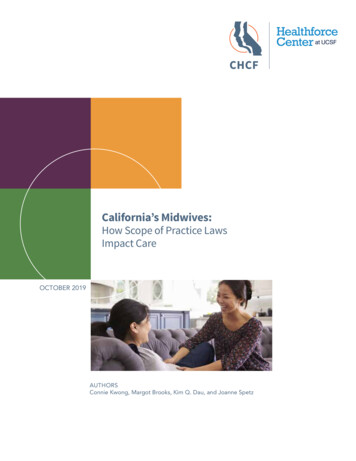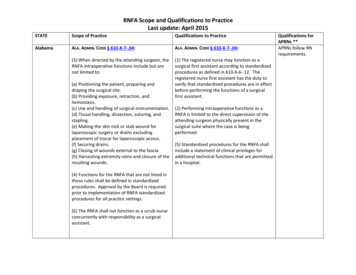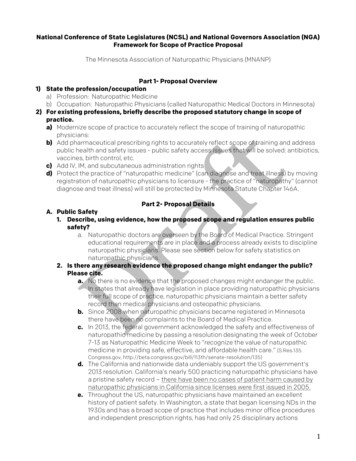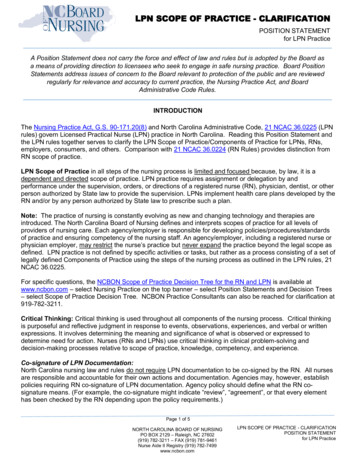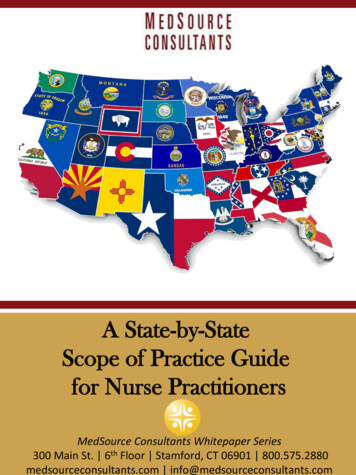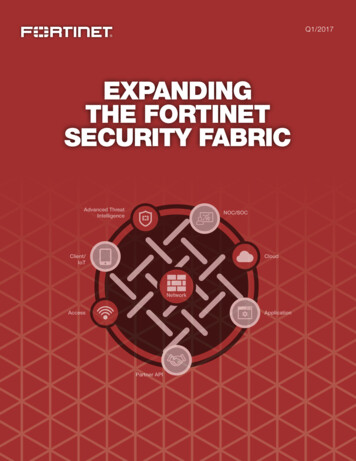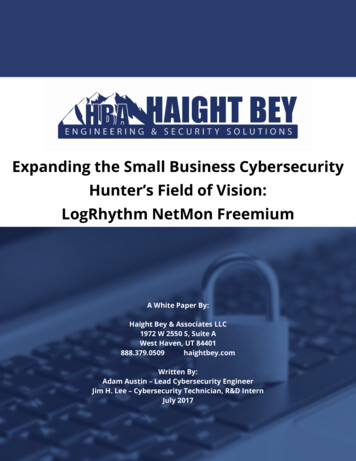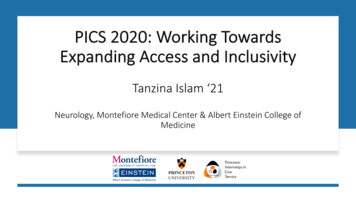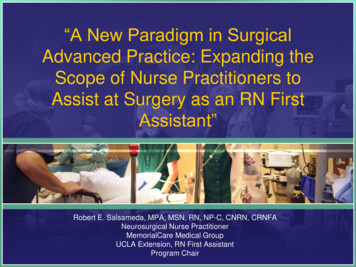
Transcription
“A New Paradigm in SurgicalAdvanced Practice: Expanding theScope of Nurse Practitioners toAssist at Surgery as an RN FirstAssistant”Robert E. Salsameda, MPA, MSN, RN, NP-C, CNRN, CRNFANeurosurgical Nurse PractitionerMemorialCare Medical GroupUCLA Extension, RN First AssistantProgram Chair
Disclosures No hay conflictos de intereses!
Objectives Describe perioperative concepts for the nursepractitioner (NP) Identifiies nursing behaviors unique for theNP/RNFA Explain nurse practitioners scope of practice as anassistant at surgery
At the end of this presentation Describe the current concept and preparation ofnurse practitioners assisting at surgery as RN FirstAssistants. Discuss the various surgical procedures requiringan assistant at surgery. Differentiate scope of practice between advancedpractice and expanded role.
U.S. Surgical Nursing Corps History Revolutionary WarCivil WarSpanish American WarWW IWW IIKorean WarVietnam WarMiddle EastAfghanistan
Missing the Boat“The ANA believes physicians have the right to develop individuals who will assist them inthe routine aspects of medical practice. However, we do not believe, as the AMAdoes, that this is an appropriate role for RNs, as this would be a waste of the nursingmanpower.”October 1970Eileen M. Jacobi, EdD.RN, October, 1970, pg. 82
Institute of Medicine (IOM)Future of NursingRecommendations1.2.3.4.Nurses should practice to the full extent of their educationand training.Nurses should achieve higher levels of education andtraining through an improved educational system thatpromotes seamless academic progression.Nurses should be full partners, with physicians and otherhealth professionals, in redesigning health care in the U.S.Effective workforce planning and policy making requirebetter data collection and an improved informationinfrastructures.
APRN Regulatory ModelLicensure occurs atLevels of Role &Population FociAPRN SpecialtiesFocus of Practice beyond role and population focusLinked to health care needs Examples include but are not limited to:Oncology, Older Adults,Orthopedics, Nephrology, Palliative care, Critical CarePOPULATION FOCIFamily/IndividualAcross lifespanAdultGerontologyWomen’s Health/Gender RelatedNeonatalPediatricsPsych/MentalHealthAPRN ROLESNurseAnesthetistNurseMidwifeClinical NurseSpecialist NursePractitioner The certified nurse practitioner (CNP) is prepared with the acute care CNP competencies and/or the primary care CNP competencies. Atthis point in time the acute care and primary care CNP delineation applies only to the pediatric and adult-gerontology CNP population foci.Scope of practice of the primary care or acute care CNP is not setting specific but is based on patient care needs. Program may prepareindividuals across both the primary care and acute care CNP competencies. If programs prepare graduates across both sets of roles, thegraduate must be prepared with the consensus-based competencies for both roles and must successfully obtain certification in both theacute and the primary care CNP roles. CNP certification in the acute care or primary care roles must match the educational preparation forCNP’s in these roles.APRN Regulatory Model
Physical Assessment
Definition of Surgery Surgery simply means opening the human bodyand cutting tissues to treat problems that arise inthe body. This may mean removing tissue, alteringtissue or simply changing the way the human bodyworks with treatments performed inside the body,typically under anesthesia
Surgical Specialties General surgeryOrthopedic surgeryNeurosurgerySpinal surgeryOtolaryngologyObstetrical surgeryGynecological surgeryCraniofacial surgery Radical neck surgeryGenitourinary surgeryCardiac surgeryThoracic surgeryVascular surgeryTrauma surgeryPlastic surgeryOphthalmologicsurgery
William S. Halstead,MD 19th century legendaryAmerican surgeon Precise surgical technique “School for safety insurgery” that emphasizedgentle tissue handling,meticulous hemostasis,sharp dissection, asepticpractice and attention todetail Lowered surgicalinfections & improvedpatient outcomes
Roles of surgeon and assistantsSurgeonFirst assistant2nd ureTying sutureSuturingFollowing suture SuctionCutting tissueClampingHemostasisSuctionCutting sutureObservation
Basic Surgical Skills Testing forJunior ResidentsThese skills include Knot tying Suturing Emergency airways Chest drains Insertion of central linesBasic Surgical Skills Testing for Junior Residents: Current Views of General Surgery Program DirectorsSanfrey & DunningtonJ Am Coll Surg 2011; 212: 406-412
Definition of Perioperative NursingPerioperative nursing is anursing specialty thatworks with and cares forpatients who are havingoperative or invasiveprocedures. Perioperativenurses work closely withsurgeons,anesthesiologists, nurseanesthetists, surgicaltechnologists, PAs, andAPRNS (e.g., NPs, CNMs,CRNA, and CNS).
Surgical Conscience The term refers to the concept of human conscience as it appliesto the performance of all of the activities that occur in theoperating room. In its strictest sense, surgical conscience is about much morethan just using good surgical technique or not taking shortcuts. It’s about consistently exhibiting ethical behavior and promotingpatient safety all the time, in every circumstance—and doing the“right thing” in a surgical setting even if nobody else is watchingor is aware that patient safety has been compromised, howeverminor or insignificant the compromise may appear to g-light-in-the-modern-or/ortoday.html
Definition of RN First Assistant (RNFA) An RN who throughadditional education andtraining has obtained thenecessary technical skillsand knowledge tofunction as the assistantto the surgeon during anoperation. Additionally, the RNFA iscompetent to performindividualized nursingcare management beforeand after surgery.
RN First AssistantIntraoperative performance of surgical first-assistanttechniques such as: using instruments/medical devicesproviding surgical site exposure,handling and/or cutting tissue,providing hemostasis,suturing, andwound management
RN First Assistant First assisting behaviors based on an extensivebody of scientific knowledge Unique behaviors delegated: medical functions expanded role Behaviors may vary depending on patientpopulations, practice environments, servicesprovided, accessibility of human and fiscalresources, institutional policy and state nursepractice acts.
American College of Surgeons (ACS)Official Statement ACS: 1980-Qualifications of Assistant in OR RNs may function as assistants when morecompletely trained assistants not available OR team cannot be reduced-scrub nurse may notact as assistant Practice privileges-hospital based RNs must adhere to state nursing practice act
American Association of NeurologicalSurgeons Statement: Neurosurgical AssistantsThe neurosurgeon in charge of the case is bestable to determine the level of competence requiredby the surgical assistant and should have theresponsibility in choosing an appropriate assistantsurgeon or surgical assistant.
AANS Statement of NeurosurgicalAssistants The assistant (whether physician, advancedpractice provider, or other) should receiveseparate reimbursement commensurate withhis/her talent and training.
Scope of PracticeThe phrase “scope of practice” (SoP) can be interpreted twoways.It’s what you know to do- suture, handle/cut tissue,provide exposure, use instruments/medical devices, andprovide hemostasis and so on.But it is also what the law allows a RN First Assistant(RNFA) in your state to do. It’s important that what you aredoing in your practice be parallel to the law on SoP in yourstate.The RNFA role is recognized in all 50 states Nurse PracticeAct’s however it is an understood statement in most.
Scope of Practice (SoP) State board of nursing (SBN) established tointerpret and enforce the state nurse practice act. Institutional policies should outline the parametersof RNFA practice according to SBN policy AORN Practicing outside SoP?
Scope of PracticeThe ultimate decision asto the use of anassistant-at-surgeryremains with theprimary surgeon, andthe role varies with thesurgical procedure,specialty area and typeof hospital. Theultimate goal is toassure quality ofpatient care.
What is the RN First Assistant role? Facilitate surgeryRight-hand professional provider to surgeon(s)Flex between rolesAbility to multi-taskContribute to patient’s outcomesUltimate patient advocateSurgery is not a static profession
Surgical Etiquette The role of the RNFA is to aid the operatingsurgeon and make the operation flow smoothly. Optimally, the RNFA follows the lead of thesurgeon like the partner in a dance. The RNFA does not try to lead but insteadanticipates the needs of the surgeon and adjustshis or her momentum to match the rhythm of thesurgeon.
Role The Surgical NP/RNFA provides– Preoperative– Intraoperative– PostoperativeCARE of the PATIENT
Role Preoperatively the Surgical NP/RNFA provides– Pre-op teaching by having a detailed understandingof the specific procedures of a surgical sub-specialty Ordering pre-op lab tests &Diagnostic studiesObtain and dictate history & physicalReconcile at home medicationsConsult with other healthcare providers
The Art & Science of Surgery Clinical reasoning Operative risks When to operateSurgical techniqueOperative principlesDecision-making
Review and interpret image studies
Surgical Anatomy and Technique Possess a profoundbasic scienceknowledge of surgicalanatomy Understand anatomicalentities involved witheach operation Be familiar with anAtlas a step-by-step ofproposed surgicalprocedures
Role Intraoperatively the NP/RNFA has competentknowledge of––––––Sterile techniquePositioningPrep/DrapeAdvanced profound knowledge of surgical anatomyIncision landmarksDissection techniques
Surgical Time Out (WHO--Surgical Safetychecklist) Core components of STOInterview patient & familyPatient identificationVerify surgical consentVerification of operative siteAssure patient & family understand surgeryH&P, PMH (Beta Blockers), PSH, and allergiesRequired on hand equipment & blood availability
Role NP/RNFA Intraoperative surgical first-assisting, includingbut not limited to, (RNFA Behaviors)––––––Providing surgical site exposureHandling and/or cutting tissueSuturing and tying techniquesProviding hemostasisUse of surgical instruments & medical devicesWound management
Role of NP/RNFA Postoperatively––––––––Write post-op note and ordersAccompany patient to PACU/ ICUProvide care of specific surgical post op patientsDaily hospital roundsPostoperative teachingTake home post op medications: RxDischarge summariesPost-op follow-up in clinic/office
Clinical Competence
Advanced Practice Providers (APP)Procedures Shunt tapsLumbar puncturesInsertion of intracranial monitorsJackson-Pratt (JP), Blake, andexternal ventricular drainmanagement and removalApplication of spinal traction(Gardner-Wells tongs, HALO ring)Device interrogation andprogramming of a neurologicaldevices such as a shunt valve,vagal nerve stimulator, deep brainstimulator or intrathecal pumpLoad brain lab datasets and assistwith neuro navigation
Preparation of the NP/RNFA Successful completion of an RNFAprogramEducation is equivalent to six (6)semester credit hours of formal,post-basic nursing studyMeets the “AORN Standards forRN First Assistant EducationPrograms”Required, as of January 1, 2016, toacquire the knowledge and skillsneeded to provide safe, competentsurgical first assistant services bycompleting a RNFA program, whichmay be a standalone program ormay be a portion of a graduate orpostgraduate program (e.g.,additional coursework included in agraduate APRN program)
Acceptable Competency & Credentialing (CCI)RNFA Programs http://www.cc-institute.org Competency & CredentialingInstitute (888) 257-2667
AORN Standards for RN First Assistant EducationPrograms Advanced practice registered nurses withoutexperience in perioperative patient care mustundergo an assessment by the program instructor.The assessment should include competency inpreoperative and postoperative care, aseptictechnique, scrubbing, gowning, gloving, creatingand maintaining a sterile field, and positioning thepatient. If it is determined that the applicant’sknowledge or skills are deficient, faculty members inthe educational institution shall develop a plan toremediate the identified deficiencies.»Approved: AORN December 2013
APRNsAlign yourself with an OR Nurse Educator Gowning & gloving Aseptic technique Creating &maintaining a sterilefield Positioning Prepping & draping OperativeinstrumentationReview: Essential Surgical Skills 2ndedition CD ROMS—Disc 1 Application of tourniquets Placement of monitoringdevices Dressings & drainagesystems Post-operative paincontrol methods Peri-Anesthesia Nursing
Credentialing & PrivilegingWhat’s the difference? Credentialing is the process of examining an individual’scredentials to determine his/her ability to meet set criteria.e.g. licensure, any degrees, or certifications. Privileging is the process a candidate must complete togain the privilege of being able to provide patient care in afacility. e.g. types of procedures, qualifications required,evaluating qualifications, and approving, modifying , ordenying the request for privilegesAORN Journal February 2013 Vol 97 No 2Clinical IssuesBryon Burlingame MS, BSN, RN, CNORPP 264-267
Interdisciplinary Joint PracticeCommittee Nursing-Nurse Practice Act Hospital Bylaws, Rules, and RegulationsAdministration Medical Staff
American College of SurgeonsPhysicians as Assistants at Surgery2013 StudyThe study reviews all procedures listed in the “Surgery” section ofthe AMA’s Current Procedural Terminology (CPT TM) 2013https://www.facs.org/ /./pas%202013.ashx
ReimbursementWill Medicare pay?Medicare pays for a surgical assistant when theprocedure is authorized for an assistant and theperson performing the service is a physician,physician assistant (PA), nurse practitioner (NP) ora clinical nurse specialist (CNS).
Summary Perioperative nursing is a specialized area of practice for theadvanced practice registered nurse (APRN). Specialty areas of practice (Surgery) require additionalpreparation. The perioperative NP who functions in the role ofthe first assistant at surgery is functioning in an expandedperioperative nursing role which requires additionalspecialized education. We need to ensure that all nurses are working to the highestlevel of their education and training as the IOM report states. Embrace this opportunity and take a risk! Si se puede! UFW motto: Cesar Chavez y Dolores Huerta1972
Gracias! for your attention!
UCLA ExtensionRN First Assistant Program (310) 825-7093 uclaextension.edu/RNFA
Post Conference QUESTIONS?Bob Salsameda, MPA, MSN, NP-C, CRNFA, CNRNMemorialCare Medical Group: NeurosurgeryNeurosurgical Nurse Practitioner2865 Atlantic Ave #202Long Beach, CA 90806562-427-5388 office562-254-0883 mobilersalsameda@memorialcare.org
References1.2.3.4.AORN Position Statement on the RN First Assistants. AORN,Inc.http://www.aorn.org/Clinical Practice/Position Statements/Position Statements.aspx.AORN Position Statement on the Perioperative Advanced PracticeNurse. AORN, Inc.http://www.aorn.org/Clinical Practice/Position Statements/Position Statements.aspx.Seifert P. Core Curriculum for the RN First Assistant. 5th ed. Denver,CO: AORN, Inc; 2014APRN Consensus Work Group, National Council of State Boards ofNursing APRN Advisory Committee. Consensus Model for APRNRegulation: Licensure, Accreditation, Certification & Education.Washington, DC: American Association of Colleges of Nursing; PRNReport.pdf.
Jan 01, 2016 · Definition of RN First Assistant (RNFA) An RN who through additional education and training has obtained the necessary technical skills and knowledge to function as the assistant to the surgeon during an operation. Additionally, the RNFA is competent to perform individ
